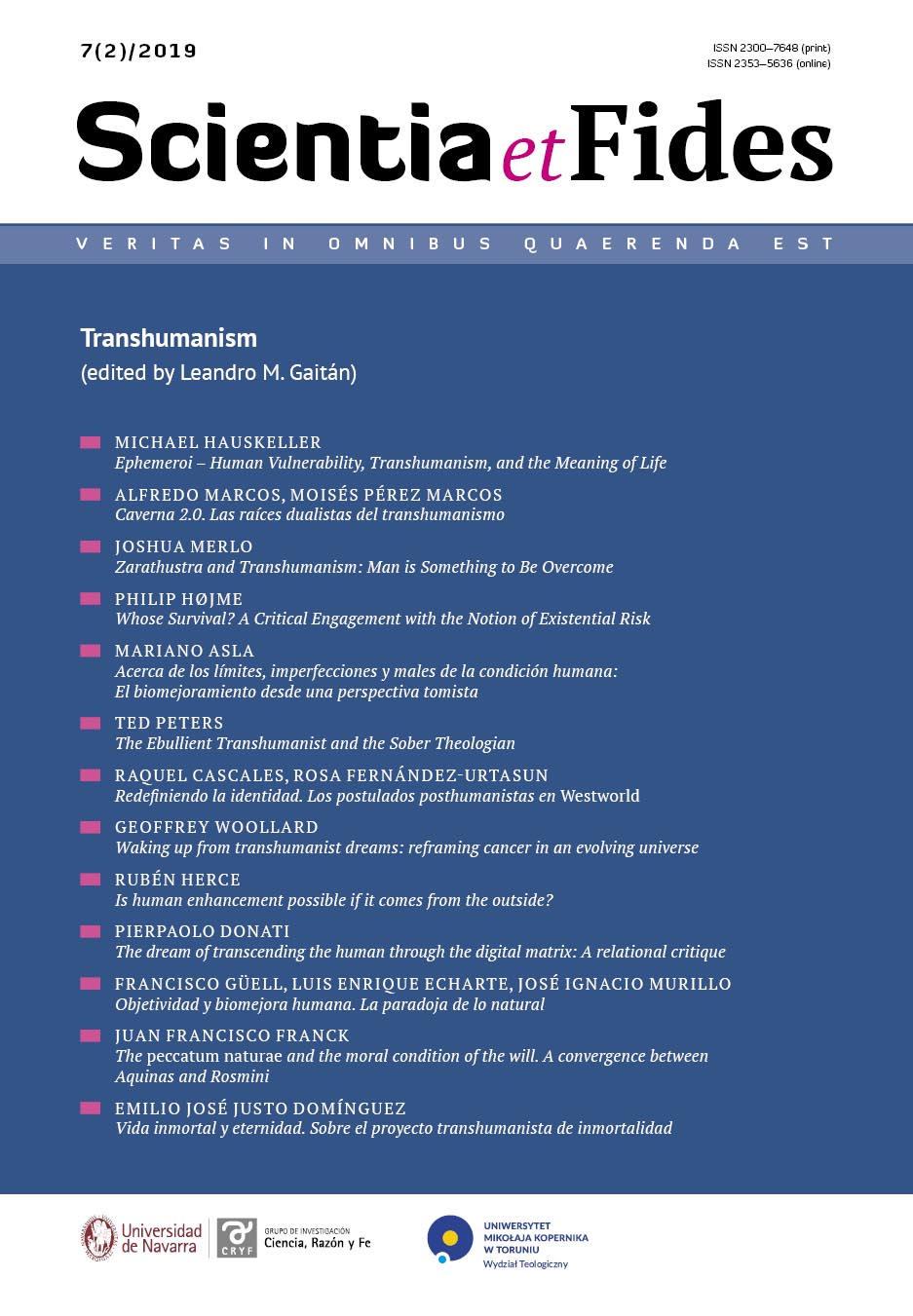The peccatum naturae and the moral condition of the will. A convergence between Aquinas and Rosmini
Palabras clave
Original sin, peccatum naturae, theological anthropology, Thomas Aquinas, Antonio Rosmini, freedom of the willResumen
My purpose in this paper is to illustrate how we can understand that what the Christian tradition calls the peccatum naturae neither consists in a mere privation nor in the total corruption of nature. There is a widespread understanding that for Catholics the sin of nature consists in the privation of the gift of original justice –the complete order of the natural tendencies and their subjection to reason as a result of the elevation of our first parents to a state of grace–, whereas Protestant denominations would in general terms understand that after the fall human nature was abandoned to a complete corruption. The two stances are sometimes seen as an either-or dichotomy. My intention is not theological, since I do not want to discuss or decide what Christians should believe in this matter, but I try to dig into the conceptual conditions under which we can coherently understand that our present condition is characterized by a twisted inclination of the will, which without destroying or totally corrupting human nature, still runs contrary to its proper good and cannot be considered as belonging or being inherent to it. I first present Thomas Aquinas’ understanding of the peccatum naturae as a moral defect. Then, I take recourse mostly to Rosmini’s work in order to better understand how there could be a moral weakness, which could be rightly called corruption, without implying that our moral condition is completely irrecoverable.Citas
Aristotle. 1999. Nicomachean Ethics. Translated by Terence Irwin. Indiannoplis: Hackett.
Dubois, Jean-Marie. 1983. “Transmission et rémission du péché originel: Genèse de la réflexion théologique de saint Thomas d’Aquin.” Revue d’Etudes Augustiniennes et Patristiques 29(3-4): 293-311.
Franck, Juan F. 2019. “Peccatum naturae y privación de la gracia en Tomás de Aquino.” Studium. Filosofía y Teología 43: 13-36.
Hoping, Helmut. 1990. Freiheit im Widerspruch: Eine Untersuchung zur Erbsündenlehre im Ausgang von Immanuel Kant. Innsbruck: Tyrolia.
Kant, Immanuel. 1974. Kritik der reinen Vernunft. In Werkausgabe, edited by Wilhelm Weischedel, vols. III-IV. Frankfurt a. M.: Peter Suhrkamp.
Kant, Immanuel. 1977. Die Religion innerhalb der Grenzen der bloßen Vernunft. In Werkausgabe, edited by Wilhelm Weischedel, vol. VIII, 647-879. Frankfurt a. M.: Peter Suhrkamp.
Kors, Jean-Baptiste. 1930. La justice primitive et le péché originel d’après S. Thomas. Les Sources. La Doctrine. Paris: Vrin.
Ladaria, Luis F. 2001. 3rd ed. Teología del pecado original y de la gracia. Madrid: BAC.
Otto, Sean. A. 2009. “Felix culpa: The Doctrine of Original Sin as Doctrine of Hope in Aquinas’s Summa Contra Gentiles.” The Heythrop Journal: 781-792.
Rhonheimer, Martin. 2000. Natural Law and Practical Reason. A Thomistic View of Moral Autonomy. Translated by G. Malsbary. New York: Fordham University Press.
Rosmini, Antonio. 1983. Antropologia soprannaturale. Edited by Umberto Muratore. Opere edite ed inedite di Antonio Rosmini, vols. 39-40. Roma: Città Nuova.
Rosmini, Antonio. 1989. Conscience. Translated by Denis Cleary and Terence Watson. Durham, UK: Rosmini House.
Rosmini, Antonio. 1991. Anthropology As an Aid to Moral Science. Translated by Denis Cleary. Durham, UK: Rosmini House.
Rosmini, Antonio. 1992. Il razionalismo teologico. Edited by Giuseppe Lorizio. Opere edite ed inedite di Antonio Rosmini, vol. 43. Roma: Città Nuova.
Sanna, Ignazio. 1997. “La volontarietà del peccato originale secondo Antonio Rosmini. Una rilettura.” In Credere pensando. Domande della teologia contemporanea nell’orizzonte del pensiero di Antonio Rosmini, edited by Karl-Heinz Menke and Antonio Staglianò, 293-340. Brescia: Morcelliana.
Scheeben, Matthias Joseph. 2008. The mysteries of Christianity. Translated by Cyril Vollert. New York: The Crossroad.
Te Velde, Rudi A. 2005. “Evil, Sin, and Death: Thomas Aquinas on Original Sin.” In The Theology of Thomas Aquinas, edited by R. Van Nieuwenhove and J. Wawryrow, 143-166. Notre Dame-IN: University of Notre Dame Press.
Thomas Aquinas. 2016. Quaestiones disputatae de malo. http://www.corpusthomisticum.org/.
Thomas Aquinas. 2016. Scriptum super Sententiis. http://www.corpusthomisticum.org/.
Thomas Aquinas. 2016. Summa contra Gentiles. http://www.corpusthomisticum.org/.
Thomas Aquinas. 2016. Summa Theologica. http://www.corpusthomisticum.org/.
Vijgen, Jörgen. 2018. “The Corruption of the Good of Nature and Moral Action: The Realism of St. Thomas Aquinas.” Espíritu LXVII(155): 127-152.
Descargas
Publicado
Cómo citar
Número
Sección
Licencia
CC BY ND 4.0. The Creator/Contributor is the Licensor, who grants the Licensee a non-exclusive license to use the Work on the fields indicated in the License Agreement.
- The Licensor grants the Licensee a non-exclusive license to use the Work/related rights item specified in § 1 within the following fields: a) recording of Work/related rights item; b) reproduction (multiplication) of Work/related rights item in print and digital technology (e-book, audiobook); c) placing the copies of the multiplied Work/related rights item on the market; d) entering the Work/related rights item to computer memory; e) distribution of the work in electronic version in the open access form on the basis of Creative Commons license (CC BY-ND 3.0) via the digital platform of the Nicolaus Copernicus University Press and file repository of the Nicolaus Copernicus University.
- Usage of the recorded Work by the Licensee within the above fields is not restricted by time, numbers or territory.
- The Licensor grants the license for the Work/related rights item to the Licensee free of charge and for an unspecified period of time.
FULL TEXT License Agreement
Stats
Number of views and downloads: 659
Number of citations: 0



